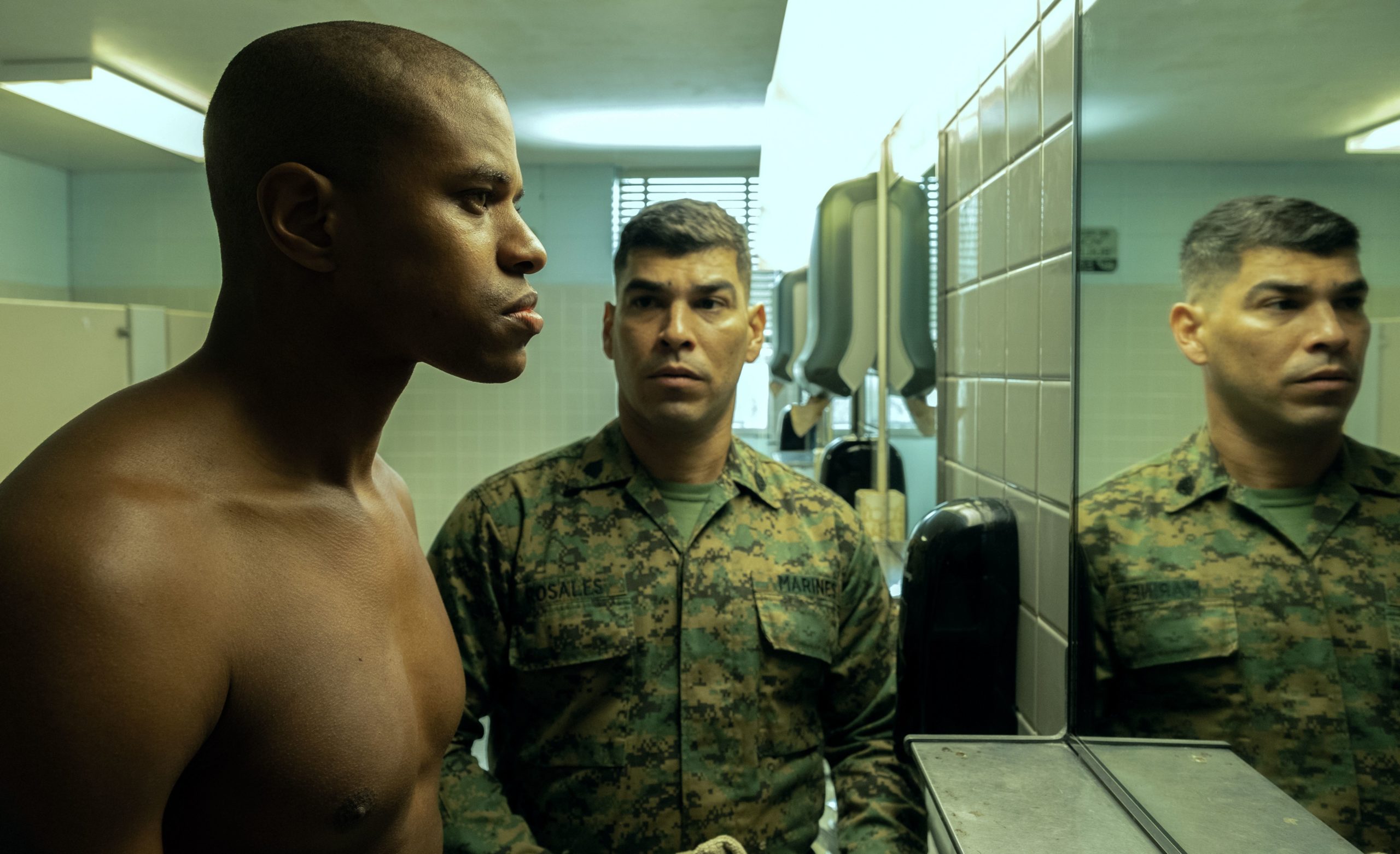It may be true that we have seen many pictures set in military barracks charting the extremities of physical stamina and hard-won male bonding, from An Officer and a Gentleman to Tigerland to Jarhead to infinity. Yet we haven’t seen one quite like Elegance Bratton’s frank, personal new movie memoir The Inspection, a “Don’t Ask, Don’t Tell” era chapter of Marine Corps. basic training endurance told this time in an introspective key—one of a gay man in an alpha-male milieu learning to live authentically not only in the barracks but to his unaccepting mother, whose long-held rejection would prove a more difficult to endure than any military regimen.
Bratton, whose own experiences mirror those in his picture, has crafted a film which at its essence is a meditation on the male form and psyche under the duress of identity, smartly skirting genre tropes to become something more elusive with faint allusions to the lyricism of Claire Denis’ Beau Travail by way of, perhaps, a less Kubrickian Full Metal Jacket.
Picture opens on hardscrabble, homeless Ellis French (Broadway star Jeremy Pope), bootcamp bound and saying his goodbyes to his unforgiving prison guard mother Inez, played with a force by Gabrielle Union, bitterly disappointed in the gay son she booted ten years prior. It seems there is no winning back her love—yet this will not stop French from trying.
French’s arrival at basic training is as expected, bellowing instructors dressing down recruits with the standard acerbic shoutdowns. French, who on induction has declared himself not gay, is quickly self-outed when a communal shower gives way to an imagined, sensual fantasy with drill instructor Rosales (a kind, sexy Raul Castillo), producing a public erection and effective fraternal banishment.
Bratton is always attuned to the effect of machismo and buried tension between men in tight bunks and quarters, producing a hothouse of conflict for French, who inches closer to a connection with Rosales. Star Pope’s fierce embrace of an outsider—someone who has been one his whole life—impressively charts French’s need to live his truth, however quietly, and the picture intrigues as he attempts to prove himself in the training sequences, including a harrowing, near-miss underwater episode.
The film wisely steps back from being wholly about the confines and sometimes harrowing routines of training, and has no particular indictment of the military in an era where LGBTQ+ in the ranks were simply part of a debate about “gays in the military,” and it isn’t about French’s desire to challenge conformity. Rather, Bratton focuses on the personal growth and change in one individual, someone who felt his life had no value yet comes to understand that despite identity differences he was integral to each man on his left and right.
Yet The Inspection is also not a formula tale of military brotherhood. What is being inspected here is the notion of masculinity, or traditional archetypes of such, and each recruit must measure up. Through training and introspection, the film slowly, carefully etches the evolution of a person learning to accept himself and asking nothing more from anyone else, and if that sounds like standard dramatic formula, The Inspection plays a bit more shaded—there are no grand proclamations, no swelling music, no public affirmations. Suggestions of the expected internal conflict are minimized; however, the gist of French’s process isn’t about accepting himself, which he has done, but about living authentically.
That’s a hard one for his drill sergeant, Laws, played by a very good Bokeem Woodbine, subverting the stereotypes of a familiar character whose agenda includes, at one key juncture, pushing French to the brink of possible death. Without an ally, French relies on the growing empathy from Rosales, for whom he harbors a forbidden attraction. Could it be mutual? Or would that be a misunderstanding? After all, Rosales is always in French’s corner, especially when hard charging Laws targets him for derision. For In a late picture exchange, what remains unspoken is charged with eroticism and a hint of danger.
Such complexity extends to Inez, who returns near the film’s conclusion, appearing proud of the son she believes has somehow changed, yet no less venomous in her rejection of his identity. In a few short, distressing scenes (including one where Woodbine intervenes with perhaps the film’s most important line), Union is fiercely, dramatically direct, her apex moment (“I love you, but I just can’t love what you are”) derived directly from Bratton’s own mother’s words. In real life, Bratton and his mother never reconciled, and she died three days prior to the beginning of shooting.
With The Inspection, Bratton, a noted photographer and documentarian (Pier Kids) making his first narrative feature, is not only working through his filmmaking style but through his own development of an identity which, he recently told me, is (like each of us) still under construction. He’s made a distinctive, compelling film from a formative life chapter, and one offering no easy resolutions.
3 stars



